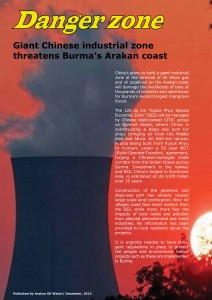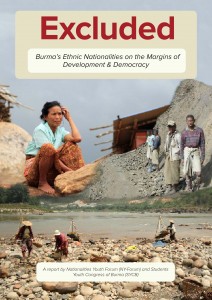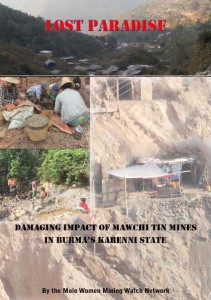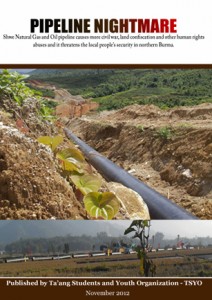Environmental and Economic Justice (103 found)
Danger Zone: Giant Chinese Industrial Zone Threatens Burma’s Arakan Coast
 China’s plans to build a giant industrial zone at the terminal of its Shwe gas and oil pipelines on the Arakan coast will damage the livelihoods of tens of thousands of islanders and spell doom for Burma’s second largest mangrove forest. The 120 sq km “Kyauk Phyu Special Economic Zone” (SEZ) will be managed by Chinese state-owned CITIC group on Ramree island, where China is constructing a deep sea port for ships bringing oil from the Middle East and Africa […]
China’s plans to build a giant industrial zone at the terminal of its Shwe gas and oil pipelines on the Arakan coast will damage the livelihoods of tens of thousands of islanders and spell doom for Burma’s second largest mangrove forest. The 120 sq km “Kyauk Phyu Special Economic Zone” (SEZ) will be managed by Chinese state-owned CITIC group on Ramree island, where China is constructing a deep sea port for ships bringing oil from the Middle East and Africa […]
Excluded: Burma’s Ethnic Nationalities on the Margins of Development and Democracy
 This report presents documented evidence that ethnic nationalities directly affected by development projects in Burma are systematically denied their right to free, prior, and informed consent (FPIC). While development related abuse has been well documented, no report has shed light on the staggering scale of the widespread denial of participation rights in Burma […]
This report presents documented evidence that ethnic nationalities directly affected by development projects in Burma are systematically denied their right to free, prior, and informed consent (FPIC). While development related abuse has been well documented, no report has shed light on the staggering scale of the widespread denial of participation rights in Burma […]
Lost Paradise: Damaging Impact of Mawchi Tin Mines in Burma’s Karenni State
 The Molo Women Mining Watch Network was formed by women from the Karenni Women’s Organization, Karenni Social Welfare and Development Centre and Karenni Evergreen Organization, who wanted to research information about the Mawchi tin mines. The network was named after the Molo Stream which flows from the Mawchi mines to the Salween River. It aims to work for women throughout our state who are facing social and environmental impacts of mining, and to empower them to solve these problems […]
The Molo Women Mining Watch Network was formed by women from the Karenni Women’s Organization, Karenni Social Welfare and Development Centre and Karenni Evergreen Organization, who wanted to research information about the Mawchi tin mines. The network was named after the Molo Stream which flows from the Mawchi mines to the Salween River. It aims to work for women throughout our state who are facing social and environmental impacts of mining, and to empower them to solve these problems […]
Pipeline Nightmare
 Shwe Pipeline Brings Land Confiscation, Militarization and Human Rights Violations to the Ta’ang People
Shwe Pipeline Brings Land Confiscation, Militarization and Human Rights Violations to the Ta’ang People
This report illustrates how the Shwe Gas and Oil Pipeline project, which will transport oil and gas across Burma to China, has resulted in the confiscation of people’s lands, forced labor, and increased military presence along the pipeline, affecting thousands of people […]
• • •Grab for White Gold: Platinum Mining in Eastern Shan State
Since 2007, destructive platinum mining has been taking place in the hills north of Tachilek, eastern Shan State, impacting about 2,000 people from eight Lahu, Akha and Shan villages. The platinum is being extracted by Burmese mining companies […]
• • •Lessons from the Kachin “Development” Experience
Burma’s government is using the promise of development as a key component in its current peace negotiations with armed ethnic organizations, proposing ceasefire first, then development, and finally a national political agreement. This process has been tried before in Kachin State with disastrous consequences
• • •Not Open for Business: Despite Elections, Investor Risk Remains High in Burma
The April 1 Burmese by-elections are being heralded as a great success both for the people of Burma and for the international community after more than a decade of sanctions. While there is cause to celebrate in the wake of initial reforms by President Thein Sein and the electoral victory of Nobel Laureate Aung San Suu Kyi, high levels of risk for investors – and the people of Burma – remain […]
• • •Burma in the Balance: The Role of Foreign Assistance in Supporting Burma’s Democratic Transition
The historic constraints on donor interventions in Burma—whether self-imposed sanctions or regime-imposed barriers—are increasingly giving way to a sense of heightened optimism about the possibilities of working on issues across the development spectrum. But while the terrain appears to be improving, there remain substantial barriers to effective programming beyond the overall pace and scope of political reform […]
• • •Burma’s Resource Curse: The Case for Revenue Transparency in the Oil and Gas Sector
Burma is rich in natural resources, particularly natural gas and oil. Yet instead of using these resources for the country’s development through industry and job growth, military leaders have been exporting them for over a decade […]
• • •လယ္ယာေျမ အဓၶမသိမ္းယူမႈ မ်ားႏွင့္ေအာင္ပြဲအပိုင္းအစမ်ား
The Farmers’ Rights Defenders Network, a Burma-based rights group, has released a new publication documenting and recounting the courageous fight against land expropriation, intimidation and false prosecution of a group of rural villagers […]
ဤအစီရင္ခံစာသည္ မေကြးတိုင္းေဒသၾကီး၊ သရက္ခရိုင္၊ ကံမျမိဳ႕နယ္၊ စစၥရံေက်းရြာရွိ ရိုးသားစြာ လုပ္ကိုင္စားေသာက္ေသာ လယ္သမားမ်ား မတရားမႈမ်ားကို မိမိတို႕၏ စုစည္းမႈအားျဖင့္ တြန္းလွန္၍ တရားမွ်တမႈကို ရွာေဖြတိုက္ပြဲဝင္ခဲ့ၾကသည့္ ျဖစ္ရပ္တခုအား […]
• • •
 All posts
All posts